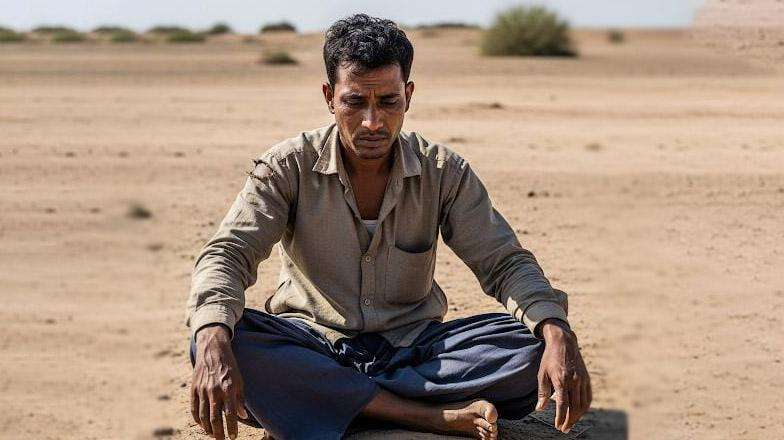Saudi Arabia has embarked on a radical transformation of its work visa system, a move designed to elevate workforce standards and attract global talent. However, this sweeping reform casts a long, worrying shadow over the hundreds of thousands of existing Bangladeshi workers, a significant majority of whom are low-skilled and currently grappling with widespread unemployment and severe safety risks within the Kingdom.
Effective July 5, 2025, for current workers and August 3, 2025, for new hires, the new framework classifies all foreign workers into high-skilled, skilled, and basic categories. This ambitious shift, central to Saudi Arabia's Vision 2030, aims to reduce reliance on low-skilled foreign labor and cultivate a more knowledge-based economy. High-skilled roles, like engineers and doctors, will be subject to rigorous points-based assessments, while mid-level technicians and supervisors fall under 'skilled.' The 'basic' category, reserved for manual labor and support roles, now carries an age limit of 60.
A Precarious Existence for Many Bangladeshis
The reality on the ground for a vast number of Bangladeshi workers is stark. While the new system targets skilled professionals, most Bangladeshi migrants have historically been employed in low-skilled sectors such as construction, cleaning, and domestic work. Even before these reforms, reports of job scarcity among Bangladeshis were alarming. "There is no work, people are suffering to get work," lament many, highlighting a deep sense of desperation and a struggle for daily sustenance.
This economic plight is exacerbated by significant safety concerns. Bangladeshi expatriates frequently become victims of abduction, vehicle theft, and extortion, with disturbing reports indicating the involvement of some within their own community in these criminal activities. For those without stable jobs, these risks become even more pronounced, leaving them vulnerable and without legal recourse.
The Skill Gap: A Looming Crisis
The core challenge for the Bangladeshi workforce lies in the undeniable skill gap. While Bangladesh is making efforts to upskill its migrant workers, the majority still lack the formal qualifications, technical expertise, and even the language proficiency now increasingly demanded by the Saudi market. The new system's emphasis on professional accreditation and skill verification programs like Qualification Verification or Skills Verification will undoubtedly create higher barriers to entry and continued employment for many.
Even for the 'basic' category, which might seem to offer some reprieve, Saudi Arabia's broader "Saudization" initiatives are gradually reducing the demand for foreign low-skilled labor. There's a growing push to fill these roles with Saudi nationals, and automation is also increasingly taking over jobs that were once performed by manual laborers. This means that even if a Bangladeshi worker meets the criteria for the basic category, the availability of such jobs is shrinking.
An Uncertain Path Forward
While the new system promises greater transparency for those applying with strong credentials, it offers little clarity or immediate solutions for the already unemployed and predominantly low-skilled Bangladeshi workers. The Saudi government has yet to detail specific benefits, rights, or cost differentials associated with each skill level, leaving many in limbo.
Employers are now strictly mandated to classify existing and new hires accurately. While this could theoretically prevent misrepresentation, it also means that workers currently performing roles beyond their 'classified' skill level might face reclassification or even job loss if they cannot meet the new, stricter criteria.
For Bangladesh, this poses a monumental challenge. To ensure its citizens can continue to find opportunities in Saudi Arabia, there is an urgent need for massive investment in skill development, vocational training aligned with Saudi market demands, and language education. Without a concerted and swift national response, Bangladesh risks seeing its largest overseas labor market become increasingly inaccessible to the very population that has long relied on it for remittances and livelihoods. The plight of its low-skilled, unemployed citizens in Saudi Arabia demands immediate and compassionate attention.
Saudi Arabia Offers 30-Day Grace Period for Expired Visit Visas
Saudi Arabia's General Directorate of Passports (Jawazat) has announced a 30-day grace period for visitors whose visit visas have expired. This welcome measure, which took effect on July 26, 2025, grants affected individuals an extended window to leave the Kingdom without incurring penalties for overstaying.
This grace period is strictly for final departure from Saudi Arabia. Individuals must exit the country before the 30 days are up to avoid facing fines or other legal repercussions.
The decision highlights the Saudi government's commitment to managing travel and visa matters with greater flexibility, particularly during busy travel periods. By providing this extended departure window, authorities aim to alleviate pressure on visitors and encourage smoother compliance with immigration regulations.

_8.jpg)
_5.jpg)
_8.jpg)




.svg)
